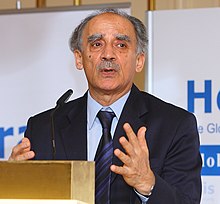Arun Shourie
| Arun Shourie | |
|---|---|

Shourie in 2009
|
|
| Minister for Telecommunication & Information Technology | |
|
In office 2002–2004 |
|
| Prime Minister | Atal Bihari Vajpayee |
| Preceded by | Pramod Mahajan |
| Succeeded by | Dayanidhi Maran |
| Member of Rajya Sabha | |
|
In office 1998–2004 |
|
|
In office 2004–2010 |
|
| Personal details | |
| Born |
2 November 1941 Jalandhar, India |
| Political party | Bhartiya Janata Party |
| Spouse(s) | Anita |
| Children | 1 |
| Residence | New Delhi |
| Alma mater |
St. Stephen's College, Delhi Syracuse University (PhD in Economics) |
| Profession |
Journalist and former World Bank Economist Politician |
| Website | Arun Shourie Blog |
Arun Shourie (born 2 November 1941) is an Indian economist, journalist, author and politician. He has worked as an economist with the World Bank, a consultant to the Planning Commission of India, editor of the Indian Express and The Times of India and a minister in the government of India (1998–2004). He was awarded the Ramon Magsaysay Award in 1982 and the Padma Bhushan in 1990.
Arun Shourie was born in Jalandar, India, on 2 November 1941. He studied at Modern School, Barakhamba and did his bachelor's in Economics(H) from St. Stephen's College, Delhi University. He obtained his doctorate in Economics from Syracuse University.
Shortly after receiving PhD in economics from Syracuse University Shourie joined World Bank as an economist in 1967 where he worked for more than 10 years. Simultaneously, between 1972–74, he was a consultant to the Indian Planning Commission and it was around this time that he began writing articles as a journalist, criticising economic policy.
In 1975, during The Emergency imposed by then prime minister, Indira Gandhi, Shourie began writing for the Indian Express in opposition to what he saw as an attack on civil liberties. The newspaper, owned by Ramnath Goenka, was a focal point for the government's efforts at censorship. He became a fellow of the Indian Council of Social Science Research in 1976. In January 1979, Goenka appointed Shourie as executive editor of the newspaper, giving him a carte blanche to do with it as he saw fit. He developed a reputation as an intelligent, fearless writer and editor who campaigned for freedom of the press, exposed corruption and defended civil liberties such that, in the words of Martha Nussbaum, "his dedication to the truth has won admiration throughout the political spectrum".
...
Wikipedia
